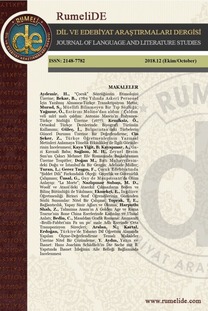Identity and alienation in Coming From Behind: a Jewish intellectual in academy
Identity and alienation in Coming From Behind: a Jewish intellectual in academy
Campus Novel, Identity, Alienation Howard Jacobson, Existentialism,
___
- Brauner, D. (2001). Post-War Jewish fiction: Ambivalence, self-explanation and transatlantic connections. London: Palgrave Macmillan.
- Brook, S. (1989). The Club: The Jews of modern Britain. London: Constable.
- Cohen, J. (1986). Reviewed work(s): Coming from behind by Howard Jacobson Review by: Joseph Cohen. Shofar, Spring, 4 (3), 42-44. Purdue UP. https://www.jstor.org./stable/42940800
- Gramsci, A. (1992). The prison notebooks: Selections (Quintin Hoare and Geoffrey Nowell-Smith, Trans.). NYC, NY: International Publishers. (Original work published 1947)
- Jacobson, H. (1993). Coming From Behind. London: Penguin. (Original work published 1983)
- Jacobson, H. (1993). Wondering Jew. Interview by Melissa Clinton Davis. New Moon.
- Jacobson, H. (1999). Meeting his metier?: A conversation with Natasha Lehrer. Jewish Quarterly, 46.3, Autumn: 67–70.
- Monnickendam, A. (1989). The comic academic novel, Barcelona English language and Literature Studies, 2:2: 153-172.
- Oral History (2011), Current British work. Past and Present, (39.2) 5-24. Oral History Society. https://www.jstor.org./stable/41332160
- Said, E. (1996). Representations of the intellectual. NYC, NY: Vintage. (Original work published 1994)
- Sartre, J. P. (1988). What is literature? and other essays. (Bernard Frechtman, Trans.). Cambridge, MA: Harvard UP. (Original work published 1948)
- Sartre, J.P. (1965). Essays in existentialism. Wade Baskin Ed. Secaucus, NJ: The Citadel Press.
- Stavans, I. (1998). The Oxford book of Jewish stories. Oxford: Oxford UP.
- ISSN: 2148-7782
- Yayın Aralığı: 6
- Başlangıç: 2014
- Yayıncı: Yakup YILMAZ
Salih Kürşad DOLUNAY, Nazlı SALUK
Üniversitelerde verilen edebiyat kuramları ve eleştiri yöntemleri derslerine yönelik bazı dikkatler
Trauma and motivation in Justin Kurzel's Macbeth
Arapça öğretiminin kavramsal çerçevesi
İlkokul öğrencilerinin sözcük öğrenme motivasyonu
Hatice VATANSEVER BAYRAKTAR, Senanur KARADAĞ, Şule ÖZTÜRK
Instagramda yabancı dil olarak Fransızca öğreten hesaplar üzerine bir çözümleme
Aziza AKRAMOVA, Aysun AVCI, Erdoğan KARTAL
Özgün baskıda tipo baski makinalarının kullanımı
Alternatif bir yayıncılık türü olarak kitlesel fonlamalı gazetecilik: Türkiye’deki örnekleri
